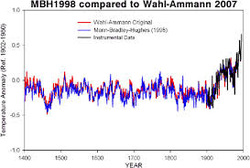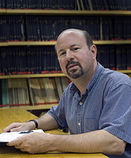
(WE should emphasize that to the best of our knowledge, Michael Mann is no relation to Whatcom County Councilman Ken Mann.)
This controversy has risen to the surface once again, because Michael Mann is suing Mark Steyn, opinion contributor for National Review along with the Competitive Enterprise Institute for questioning the veracity of Mann's claims. This is significant because throughout history, at least since the Age of Enlightenment, science has always been a process of discovery in which formulators and promoters of hypotheses have the burden of proof, and skeptics and critics are necessary to question any aspect of it. The proof involves the development of reproducible experiments which can be run by other scientists to either confirm or discredit the hypothesis. When the science has evidence of corruption, falsification of data, or any agenda apart from discovering nature's own truth, then it is the responsibility of all of us to question the purity and quality of the work.
Much has been made of the fact that the theory of Anthropogenic Global Warming has been peer reviewed, and the consensus is that the hypothesis is valid and therefore, real. However, science doesn't work that way. The hypothesis must agree with nature, and not necessarily with other scientists. This can only be done through reliably repeatable experiments. (Note: computer models are not experiments!) Peer review can merely verify that the experiments were of a valid design, and conducted according to accepted procedures, and accounting for errors where they're detected. This can be a decades-long process. As technology improves, errors can be discovered that could completely invalidate a hypothesis, or render it incomplete. This happened in the late 1800s when Newton's laws of motion began showing discrepancies, and Einstein finally explained ca. 1905 what some of the problems were, with his special and general theories of relativity. Einstein's theories are still being refined and extended. In each case, ongoing skepticism, experiment and peer review gets us closer to nature's truth.
This process of critical review has been corrupted by politics in the climate sciences. There's too much money and power at stake, and honest scientists find it very difficult do honest research, at the risk of losing their government grants or their jobs researching politically correct theories at universities, should they start publishing unpopular results. And since climate scientists have shown evidence that they won't do their jobs honestly (cf., Climategate), a few (very few) editorial writers who are still watchdogs and not lapdogs, have written critical reviews on the subject. Some scientists don't like this. They feel it is libelous. They fear for their jobs, or their reputations. And they want to sue these critics for having the temerity to question the integrity of the process and the profession.
Robert Tracinski at Real Clear Politics opines,
The global warming hysteria is disastrous enough in its intended goal, which is to ban the use of our cheapest and most abundant fuels and force us to limp along on "alternative energy" sources that are insufficient to support an industrial civilization. But along the way, the global warming campaign is already wrecking our science and politics by seeking to establish a dogma that cannot legally be questioned.
The critical point in this campaign is a defamation lawsuit by global warming promoter Michael Mann against Mark Steyn, National Review, and the Competitive Enterprise Institute.
When the "Climategate" e-mails were leaked five years ago, a lot of us speculated that it could all end up in the courts, given the evidence that climate scientists were pocketing large sums of government money on the basis of a scientific consensus they were manipulating behind the scenes. But it's typical of our upside-down political and cultural environment that when this issue does reach the courts, it will be in the form of a lawsuit against the climate skeptics.
Steyn and the others are being sued for criticizing Mann's scientific arguments. In the case of the Competitive Enterprise Institute, for example, they're being sued for Rand Simberg's complaint that Mann "has molested and tortured data." (See a summary of the case here.) Frankly, I'm not sure how I escaped this lawsuit myself. I shall have to review what I have written and see if my language was not sufficiently inflammatory. Perhaps I don't have pockets deep enough to be worth looting. Or perhaps I'm not a big enough target to be worth intimidating and bankrupting. Note the glee with which the left slavers at the prospect of taking out a prominent voice on the right, with one leftist gloating that "it's doubtful that National Review could survive" losing the case.
Here is the point at which we need a little primer on libel laws, which hinge on the differentiation between facts and opinion. It is libel to maliciously fabricate facts about someone. (It is not libel to erroneously report a false fact, so long as you did so with good faith reason to believe that it was true, though you are required to issue a correction.) But you are free to give whatever evaluation of the facts you like, including a negative evaluation of another person's ideas, thinking method, and character. It is legal for me, for example, to say that Michael Mann is a liar, if I don't believe that his erroneous scientific conclusions are the product of honest error. It is also legal for me to say that he is a coward and a liar, for hiding behind libel laws in an attempt to suppress criticism.




 RSS Feed
RSS Feed
